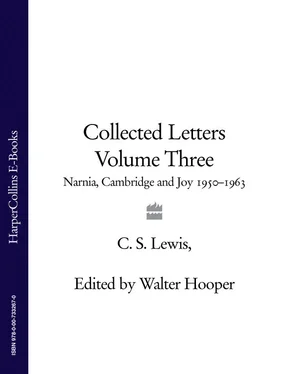I am so glad you saw your daughter. I can’t understand that whole business. One is always told over here that America is a country where Women are on top: but the real evidence I have (and I’ve had a good deal by now) suggests a degree of male tyranny that is quite unknown here.
By the way did the reviewers mean ‘writes like a woman’ to be dispraise? Are the poems of Sappho 148 or, if it comes to that, the Magnificat , 149 to be belittled on the same ground.
You are quite right, I didn’t go to the Coronation. I approve of all that sort of thing immensely and I was deeply moved by all I heard of it; but I’m not a man for crowds and Best Clothes. The weather was frightful.
As you had forgotten what called for my remarks about WE, THE PEOPLE, so I have now quite forgotten what the said remarks were! That is one way correspondence differs from conversation. On the other hand neither party can interrupt! Oh–I’m often in a dither: usually when I’ve made two engagements for the same time in different places.
Yours
C. S. Lewis
TO HILA NEWMAN (W):
Magdalen College,
Oxford.
23/6/53
Dear Hila
(I never met this name before. What language?) You have got it right. No: the three stories you know are the only three that have yet come out. The fourth will be out this Fall (as you say: we say ‘this Autumn’). I am so glad your friends like the books. It’s funny they all began with the second one.
All good wishes,
Yours
C. S. Lewis
TO CLYDE S. KILBY (W): TS
REF.325/53.
Magdalen College,
Oxford.
26th June 1953.
Dear Mr. Kilby,
Thanks for your letter of the 24th. I should be happy to see you at noon on Wednesday 1st July in my rooms here, if that would fit in with your plans. 150
Yours sincerely,
C. S. Lewis
TO WARHELD M. FIROR(BOD):
Magdalen College,
Oxford.
June 27th 53
Dear Firor–
I was reminded of my sins (to you and to many other correspondents) the day before yesterday on receiving a visit from a coal-king called Hishop of (I think) Ohio, who turned out to be an old patient of yours. Apparently you ‘carved him as a dish fit for the gods’, and even proceeded, while his wounds were yet green, to the more drastic operation of lending him the Screwtape Letters . In spite of that he is your v. warm admirer.
I have been neglecting everything except the bare minimum of routine duties for many months, being worn to a ravelling by continued sinusitis in all its varying phases of much catarrh and little pain, much pain and little catarrh, and (sometimes) much of both. I have rejected the operation because I keep on meeting people who have had it and been no better afterwards. It now begins to clear. This disease has, however, one excellent quality: its pain, unlike all other pains I have known, always gets better at night. But I mustn’t spread myself on the symptoms since hearing symptoms is rather ‘a busman’s holiday’ (have you that phrase?) for you. One may perhaps add that the internal smell (‘bad smell in the nose’ like ‘bad taste in the mouth’) is rather allegorical: the world seems to stink, but (as often) the real corruption is in the observer.
I’ve just read S. V. Benét’s Western Star which I thought, as far as it went, even better than John Browns Body. 151 Certainly more interesting and of more real value (so far as any comparison is possible) than any of the ‘modern’ poetry produced on this side of the Atlantic. I wish your bad poets weren’t so exportable! You sent us Eliot in the flesh and Pound in the spirit.
My brother and I are both ‘with book’ at present and read proofs all day. 152 Mine is a big and (to the taste) dull, academic work.
I always hope to hear that you are coming to Oxford again. All blessings.
Yours
C. S. Lewis
TO MARY VAN DEUSEN (W):
Magdalen College,
Oxford.
June [2] 9th 53
Dear Mrs. Van Deusen
I never know what to say in cases like that of the sick child’s mother whom you mention. There seems plenty of evidence that God does sometimes, in answer to prayer, heal in miraculous fashion: sometimes, it wd. appear, not. No doubt there are very good reasons for both.
I wouldn’t quite say that ‘religious Practices help the search for truth’ for that might imply that they have no further use when the Truth has been found. I think about the practices what a wise old priest said to me about a ‘rule of life’ in general-‘It is not a stair but a bannister’ (or rail or balustrade–I don’t know what you call it in America), i.e. it is, not the thing you ascend by but it is a protective against falling off and a help-up. I think thus we ascend. The stair is God’s grace. One’s climb from step to step is obedience. Many different kinds of bannisters exist, all legitimate. It is possible to get up without any bannisters, if need be: but no one wd. willingly build a staircase without them because it would be less safe, more laborious, and a little lacking in beauty. Give my love to Genia. I am so glad all goes well.
Yours
C. S. Lewis
TO MARY WILLIS SHELBURNE (W):
Magdalen College,
Oxford.
July 10th 1953
Dear Mrs. Shelburne
Thanks for your letter of June 30th. I found the poem interesting–especially metrically interesting. From that point of view 1. 3 is the important one: notice how it keeps the five beats because one is forced to give full value to the two long monosyllables-‘one goal’–
‘Remémber the ónly, the óne góal of lífe’
L.2 where you collapse into a 4 beat-rhythm is not, I think, nearly so good. ‘God speed’ at the end is a trifle weak isn’t it? And if one puts it into God’s mouth–as the context invites one to do–a little comic: like in the old miracle play where God, in a moment of excitement, is made to exclaim ‘By God!’
You know, over here people did not get that fairy-tale feeling about the coronation. What impressed most who saw it was the fact that the Queen herself appeared to be quite overwhelmed by the sacramental side of it. Hence, in the spectators, a feeling of (one hardly knows how to describe it)-awe–pity–pathos–mystery. The pressing of that huge, heavy crown on that small, young head becomes a sort of symbol of the situation of humanity itself: humanity called by God to be His vice-regent and high priest on earth, yet feeling so inadequate. As if He said ‘In my inexorable love I shall lay upon the dust that you are glories and dangers and responsibilities beyond your understanding.’ Do you see what I mean? One has missed the whole point unless one feels that we have all been crowned and that coronation is somehow, if splendid, a tragic splendour.
I am so glad about your short but precious conversation with your granddaughter. The whole unnatural situation is v. hard for me to understand. Perhaps it will end. We must both pray.
By the way isn’t a motor-car the safest place to be in a thunderstorm: isolated from the earth by rubber tyres wh. are non-conductors? Or do I only display my ignorance?
Yours
C. S. Lewis
TO ROGER IANCELYN GREEN (BOD):
Magdalen
July 10th 1953
My dear Roger
Thank you very much for The Mahatma & the Hare. 153 (But you must stop doing this sort of thing: I didn’t forbid roofers in order to get presents instead!). The narrative of the hare is almost unbearable, as it was meant to be, yet unfairly, for it depends on giving poor Wat a human mind. If he had that he would perhaps have guns too. The book is impressive, and shows much more restraint than R.H. usually does in vision literature.
Читать дальше












